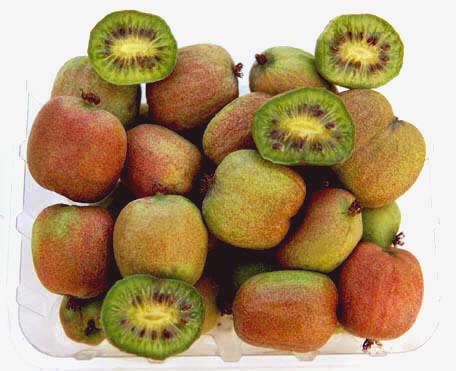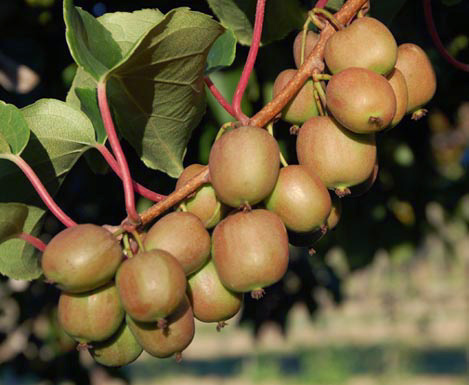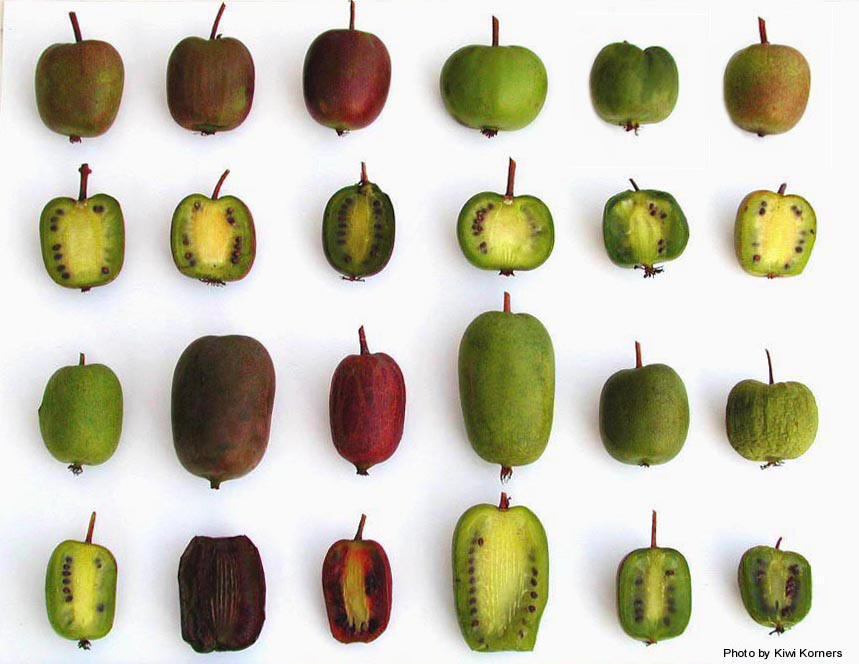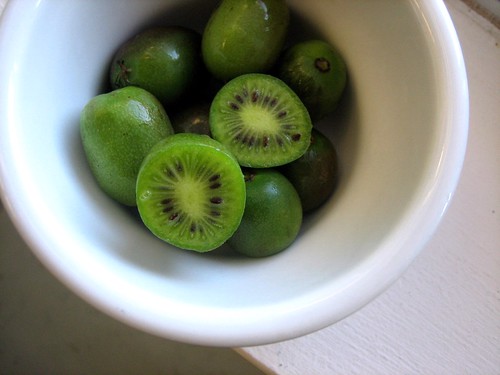KiwiBerries - unique, organic fruit varieties nurtured by the sun, naturally vine ripened, highly nutritious, rich in antioxidants, and outrageously great tasting. http://www.kiwiberry.com
"KiwiBerries" are a nutritional powerhouse, they are the most nutrient dense of all the major fruits, and are an extremely healthy food source. Containing almost 20 vital nutrients, Kiwi Berries are considered a super fruit! They're not just good for you...they're delicious.
Our berries are higher in nutrient value because we grow them on our modified T-bar trellises where they receive lots of sunshine.
They are rich in antioxidants which are known to reduce the risk of cardiovascular disease, cancer, and help slow the aging process, to name just a few.
The benefits of these flavorful berries include:
Nutrition Facts |
Serving Size: 6 oz. (170 grams) |
Amount per serving |
Calories 130 Calories from Fat 9 |
% Daily Value * |
Total Fat 1g 1% |
Saturated Fat 0g 0% |
Cholesterol 0mg 0% |
Sodium 0mg 0% |
Total Carbohydrate 30g 10% |
Dietary Fiber 8g 31% |
Sugars 16g |
Protein 2g |
Vitamin A 6% - Vitamin C 120% |
Calcium 10% - Iron 4% |
* Percent Daily Values based on a 2,000 |
calorie diet. Your daily values may be higher |
or lower depending on your calorie needs. |
Calories 2000 2500 |
Total Fat Less than 65g 80g |
Sat Fat Less than 20g 25g |
Cholesterol Less than 300mg 300mg |
Sodium Less than 2,400mg 2,400mg |
Total Carbohydrate 300g 375g |
Dietary Fiber 25g 30g |
Calories per gram |
Fat 9 - Carbohydrate 4 - Protein 4 |
Research from the Kiwi Enthusiasts Journal
The future for kiwi as an important cancer prevention agent seems encouraging in light of recent studies. ( Noburu Motohashi ) Kiwifruit Enthusiasts Journal.
Kiwi is a nutritional powerhouse and an extremely healthy food source. They contain twice the amount of Vitamin E of an avocado fruit, with only 60% of its calories. Kiwi is rich in folic acid, high in fibre, excellent in potassium (higher per ounce than bananas), an extraordinary source of chromium, and have almost no sodium. Some 20 nutrients, all but 3 in meaningful amounts, are contained in this fruit. In this regard kiwi resembles a vegetable more than a fruit, and it may be considered a "super fruit". The Vitamin C content is almost five times that of a medium orange.
The positive elements of these berries are of valuable importance to both health consciousness, and medical benefits as well. In China, Actinidia in general is known as a medicine against cancer. It is said, the Vitamin C, actinidia and 3-Oxy 2- pyranol are efficient in curing cancer. In China people use those fruits as prophylactic medicine and curative medicine.
Kiwi is an ancient Chinese fruit tree indigenous to southern Asia whose popularity has grown since the beginning of this century when it was introduced to New Zealand. Since this time, its use as a traditional Chinese medicament has been investigated and studies of "cancer" records of China reveal that kiwi has been used in anticancer therapy. Recent studies have elucidated two active principles of kiwi, whose modes of action have been investigated. Ascorbic acid, present in relatively great amounts in kiwi, act both directly and indirectly in preventing some types of cancer. It acts directly in the quenching of cancer causing free radicals and the inhibition of the production of carcinogenic N-nitroso compounds. Indirectly, ascorbic acid promotes the production of interferon, and the increased production of "second messengers" such as cyclic-AMAP and cyclic-GMP. Another constituent of kiwi, actinidin protease, acts directly to break down animal proteins in the digestive tract thereby aiding in the digestion of meats. This facilitates improved maintenance of the digestive tract in the defense against cancer.
The overall composition of A. Arguta from a thesis by Philippe Rothgerber published in the Kiwifruit Enthusiasts Journal Vol. 6:
Acidity | 5% dry matter of 1.29% of fresh fruit |
Glucose | 32.6% of dry matter or 8.47% of fresh fruit |
Starch | ( 25% of dry matter) |
Cellulose | ( 15% of dry matter) |
Pectin | ( 5% of dry matter) |
Protein | ( <3% of dry matter) |
Ash | ( only very little) |
Vitamin C | 80mg/100g ( 400 mg% of dry matter) |
Vitamin PP | 55mg/100g |
Provitamin A ( carotin ) | 0.28mg/100g |
Vitamin B1 and B2 |
3 Oxy 2 paranol (a substitute which separates nitrites) |
Actinidin (a ferment [enzyme] which stops coagulation) |







